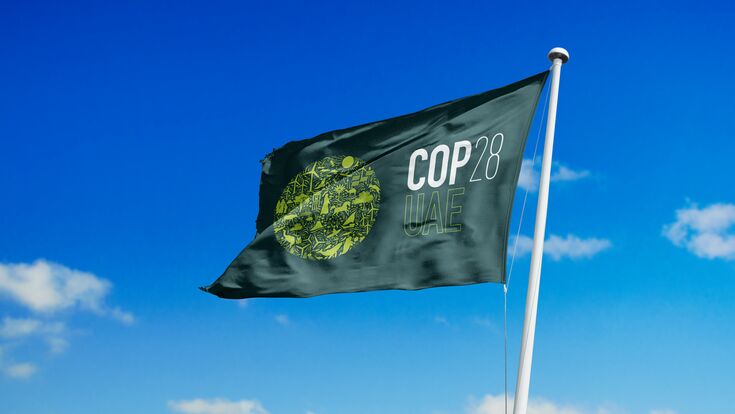UN Climate Change Conference COP 28 : Stocktaking in Dubai: Paris climate targets put to the test

Countdown to Dubai - and countdown to 2030: Eight years after the Paris Agreement was adopted at the UN Climate Change Conference (COP) in 2015, a global stocktake on implementation will be presented for the first time at COP28 in Dubai in accordance with the treaty. The UNFCCC (United Nations Framework Convention on Climate Change) report, which was published on 14 November, revealed that even if all NDCs were implemented, the gap would be large. For example, global emissions in 2030 would only be two per cent below the 2019 level, but according to the Intergovernmental Panel on Climate Change (IPCC), a reduction of 43 per cent should be achieved for the 1.5-degree target. Governments are only taking "baby steps" in the face of the climate crisis, criticised UNFCCC Executive Secretary Simon Stiell.
Suggested Reading: COP28. We are at the halfway point to reach the 2030 goals. A comment by ISWA President Carlos Silva Filho.
One day later, however, the host of COP28 exuded optimism on its online presence: President Sultan Ahmed Al Jaber praised the USA and China for their announced efforts to support a tripling of renewable energy capacities on a global level by 2030. The New York Times, however, noted that the part of the joint announcement addressing China's fossil-free power supply was missing.
A flaw that is also inherent in the Paris Climate Agreement, but fossil fuels and the phase-out of fossil fuels are certainly on the agenda in Dubai. The COP President is also criticised on this point, as Ahmed Al Jaber is not only the Minister of Industry, but also the head of the state-owned oil company of the United Arab Emirates.
Suggested Reading: The significant potential of better waste and resource management for climate mitigation
However, the discussion about phasing out fossil fuels will be unavoidable, as the global greenhouse gas budget requires a rather rapid switch to renewables. The main goal of the conference and its representatives from around 200 nations from 30 November will at least have to be a significant reduction in gas, oil and coal. Even in the run-up to the UN Climate Change Conference, memories of the conference in Glasgow two years ago were evoked. That conference was "only" about phasing out coal. Instead of this commitment ("phase-out"), it ended with a frustrating compromise for many participants, the gradual reduction ("phase-down") in the final declaration.
The "out" or "down" debate will now make a comeback two years later, along with the question of what the word "unabated" is all about. In Glasgow, the final declaration also stated that the gradual phase-out of coal is "unabated", as can be read in point IV "Mitigation". At the same time, according to the US climate agency NOAA, COP28 is taking place in the warmest year since records began 174 years ago - with a probability of over 99 per cent.
Gerrit Hannsen from the German Institute for International and Security Affairs, which acts as an advisory foundation for both the German Bundestag and the German government, wrote in a report at the beginning of July that it is not just the debate about the term "unabated" that could become an obstacle. At the preparatory conference in Bonn in June, Hannsen already saw the "central pillars of the Paris Agreement under fire - because there is a battle over the interpretation of key issues in the document.
Suggested Reading: COP28 - here comes ISWA!
UN Secretary-General António Guterres at least does not want to get involved in these debates. Instead, he called for increased investment in renewables, accompanied by a phase-out of fossil fuels - in other words, an uncompromising solution. At the same time, he emphasised that industrialised countries must restore trust "by honouring their financial commitments".
After all, the promised financial flows to the Global South will once again be fought over in Dubai. Neither the "Loss and Damage" pot has yet been filled, nor have the climate change adaptation funds been fully financed.
And in the Global South, the debate as to whether electricity comes from fossil fuels or renewables or even nuclear power does not exist for many people. According to the International Energy Agency's (IEA) outlook for the African continent from last year, 600 million people, or 43 per cent of the population, have no access to electricity here alone. The majority of these people live in the sub-Saharan region. A region that also raises the question of "climate justice" because, according to many studies, these 49 countries are particularly vulnerable to the consequences of the climate crisis.
Major tasks therefore await the decision-makers at the climate conference in the largest city in the United Arab Emirates, which runs from 30 November to 12 December.
